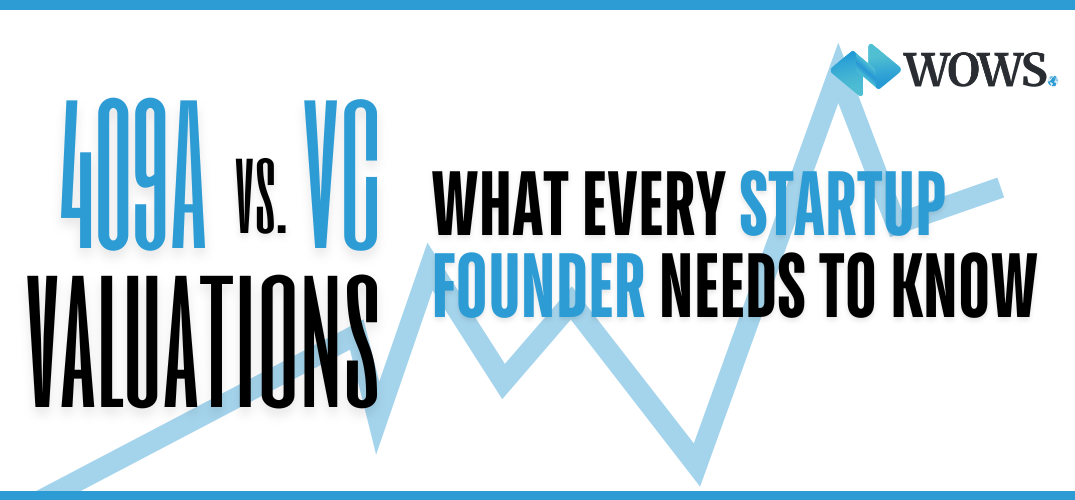Pre Money and Post Money Valuation - What Does it Mean?
Pre Money Valuation Post Money Valuation Startup's Valuation

Startup founders will often hear the terms pre-money valuation and post-money valuation mentioned. But what is the difference between these two valuation terms and why are they so important for founders to understand?
Let’s first give a brief answer on how these terms differ and then get into details of each:
The Short Answer is…
Pre-money and Post-money valuations differ in their timing. Both terms are measures of a company’s valuation. They are pivotal when it comes to determining the worth of a company.
- Pre-money valuation relates to a company’s value without the inclusion of external funding or from the latest round of fundraising.
- Post-money valuation includes any outside financing or the latest injection of capital received by a company.
The above may appear straightforward, however, founders can find valuation discussions confusing depending on where they are at in their startup and funding journey.
As will be found, your startup's valuation and the associated risks will change significantly as soon as the decision is made to find additional funding. This is regardless of whether that funding comes from angel investors, venture capitalists, or you go the bootstrapping route.
Once any type of funding is involved your startup will have a pre-money valuation and a post-money valuation. Because of this, founders must understand which term is being referred to. Why? Because they are critical valuation concepts.
With that in mind, let's take a further look at each:
Pre-Money Valuation is…
The best description of pre-money valuation is how much a startup might be worth before receiving any outside investments into the company, or before a funding round that your startup is actively raising.
This valuation is the one given to any potential investor before a funding round. In essence, it is to showcase what your company is currently worth.
It also needs remembering that the pre-money valuation of your startup will change over time. As an example, this valuation will differ before you receive initial funding versus before a Series A funding round.
Potential investors need this valuation for two reasons. First, it gives them an idea of the startup's current value. Second, it provides the actual value of each issued share.
Post-Money Valuation is…
As for a post-money valuation, this refers to how much your startup is worth after outside financing or the latest injection of capital has been received. This will show a significant ownership change because those new investors will receive a percentage value of your company.
A post-money valuation is a more set amount. It is based on the true money worth of your startup and does not include any potential factors.
Valuation is all in the Calculation!
As discussed above, the terms pre-money and post-money both relate to valuation measures. They determine a startup's valuation and how much the company is worth. The difference primarily comes from the timing of such valuation.
Although the difference between these two valuations may seem clear, there are certain factors that founders need to bear in mind when addressing valuation in general. Doing so will help to understand why the numbers of each are so significantly different.
In the main, valuation is fluid, it involves speculation, and it is flexible. As is seen daily, the value of any company can go up or down. This fluctuation depends upon a whole host of factors and the reality is that valuation is driven completely by the markets themselves, performance indicators, and the opinions of those involved.
When it comes to a startup's lot, it stands to reason that founders and their existing investors will want a high valuation. The reasons for this are clear. They believe in the business concept and idea. They also want to protect their shares by ensuring they are not diluted once new funding is taken on.
On the other hand, new investors will be looking at and assessing all angles of risk. This has to be seen as good business practice because they want to secure their financial health. That will only be achieved by ensuring they are not overvaluing and therefore overpaying for a stake in a startup.
This means that the way an investor positions their pre-money valuation will affect the post-money valuation. It will also ultimately affect founders, all current shareholders, and investor valuations.
It is all in the Timing…
As described, the pre-money valuation of your startup will be set prior to the investment round coming up. The post-money valuation is a fixed valuation that is set once the round in question is complete.
Because of these timings, post-money valuation is far simpler. The numbers agreed upon will always be fixed. Having said that, even though post-money valuations are simpler it is the pre-money valuation that is more often used.
To explain further, pre-money valuations can vary so much due to the timing of that valuation and the number of factors in place at that time. Founders will find that their pre-money valuation is affected by such things as:
- ESOPs (Employee Share Option Plans): These are plans given to company employees to vest as shareholders.
- Debt-to-equity conversions: This refers to any potential situation where debt your startup takes on has been promised to be paid back by an agreed value amount of stock.
- Pro-rata participation rights: These are typically (non-contracted) rights for previous investors. They allow them to invest in future funding rounds at a set level to maintain their ownership rights.
- Value and market opportunity: This can vary hugely because it relates to what founders and current stakeholders see as the value and market opportunities related to your startup.
Staying with timing, this is everything when it comes to pre-money valuation. Why? Because it will affect the post-money valuation.
PPS is the Focus
When considering pre-money valuation, PPS (Price Per Share) will be the focus. This relates to the market PPS of stock or the most recent price that stock has traded for. This is a key function of market forces and comes about when the price a buyer is willing to pay for a stock matches what a seller is willing to accept for it.
A founder's goal when taking on funding is to achieve a solid PPS. By doing so they will be setting themselves up for either a successful IPO (Initial Public Offering) or acquisition at some future point.
When discussing pre-money valuation this will ultimately come down to what an investor is willing to pay per share in your startup. For PPS calculation purposes, take the pre-money valuation and divide it by the fully diluted capitalization.
Because the PPS and the pre-money valuation are directly proportional, if one goes up, the other goes up. This means the greater the pre-money valuation, the more an investor pays for each share but for the same investment amount the investor receives fewer shares.
It stands to reason that as a founder you will want to ensure you are putting yourself in a strong position to achieve a successful end game. This means that timing your funding to align with excellent pre-money and post-money valuations is crucial.
Why are These Valuations so Important?
The importance of pre-money valuation and post-money valuations cannot be underestimated. This is because they have a huge impact in two respects.
First, they determine the percentage of your startup that an investor will acquire for a given investment amount. Second, it will also determine the percentage of your startup that existing stockholders will retain.
On top of this, founders that have a deep and clear understanding of pre-money and post-money valuations will have an edge when it comes to valuation negotiations.
Such knowledge and understanding will show that you understand these valuations are an integral part of any deal dynamics. It will also show potential investors that you fully understand the mechanics of your startup and its capitalization table.
Calculating Pre-Money and Post-Money Valuations
With all of the above detail taken into account let’s now understand how to break down the calculation of these values:
Pre-money valuation calculations
In the first instance, founders need to keep in mind that pre-money valuation is pre-funding. The trick here is to factor in the post-money valuation you are looking to achieve for your company. This point is critical when calculating the pre-money valuation you intend to pitch to investors.
To do that, use the following formula:
Pre-Money Valuation = Post-Money Valuation - Investment Amount
Founders need to understand the factors they have in play that will attract investors. These then need incorporating into what you project your post-money goal to be. This will lead to a founder's understanding of the investment amount being sought and how you will finally present a pre-money valuation to investors.
Post-money valuation calculations
Deciding on the post-money valuation you are looking for is far more straightforward than calculating your pre-money valuation.
The thing to keep uppermost in your mind when calculating post-money valuation is understanding exactly what percentage of your startup the new investor(s) will receive. Once that is understood you will also be clear on what overall value is taken away.
To help you calculate post-money valuation, use this formula:
Post-Money Valuation = $ Investment Amount ÷ % investor receives * Pre-money Valuation
Keep in mind that post-money valuation will be a fixed $ amount. Unlike the way pre-money valuation can be adjusted, post-money valuation will not flux.
Help is at Hand…
First appearances of pre-money and post-money valuations can seem relatively unimportant. Be assured, they are not! How the valuation method is carried out can have a major impact on ownership percentages.
While the percentage ownership difference may appear low at a pre-money valuation - for example, 20% ownership. The same amount of investment post-money can give the investor 25% ownership.
A 5% investor ownership increase at an early stage of your startup's life may not seem like much at all. However, if your company goes public that 5% could be worth millions of dollars!
It is worth remembering that in general, a startup has a higher value if valued pre-money. This is because the valuation does not include the invested amount.
With such margins and potential errors involved, smart startup founders should seek expert advice and guidance relating to pre-money and post-money valuations.
WOWS Global is expertly placed to give that. Through our state-of-the-art online ecosystem, we offer founders everything they need to successfully grow their company in a structured and healthy way.
This includes a secure, online cap table that holds all essential details and will allow for calculations to be made before fundraising.
Our experienced team will be on hand to guide you through the fundraising process and advise exactly how various pre-money and post-money valuation scenarios will affect your bottom line.
Taking advantage of our expertise can lead to a healthier company and a far wealthier exit strategy!
To find out more, please reach out to us for an initial no-commitment discussion at:
Related Posts
-

409A Valuation VC valuation Startup Fundraising Post Money Valuation
409A Valuation vs. VC Valuation: What Every Startup Founder Needs to Know
Navigating the world of startup valuations can be challenging, especially when balancing 409A valuations for IRS compliance with VC valuations for fundraising. In this article, we break down the key differences between these two crucial valuation types, how they impact your company’s growth, and why both are essential for startup founders in Southeast Asia and the Middle East. Whether you’re issuing stock options or negotiating with investors, understanding these valuations can set your business up for long-term success. -

409A Valuation Post Money Valuation Fair Market Value
Case Study: Comprehensive 409A Valuation for FinTech Solutions Group
Learn how WOWS Global provided FinTech Solutions Group with a detailed and accurate 409A valuation, ensuring compliance and supporting strategic financial planning.
